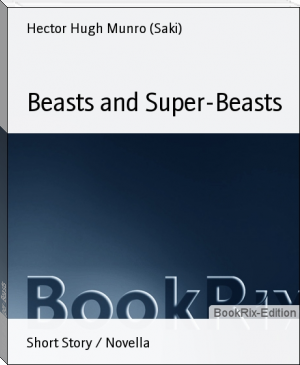Beasts and Super-Beasts - Hector Hugh Munro (Saki) (paper ebook reader TXT) 📗

- Author: Hector Hugh Munro (Saki)
Book online «Beasts and Super-Beasts - Hector Hugh Munro (Saki) (paper ebook reader TXT) 📗». Author Hector Hugh Munro (Saki)
broken away and left us!"
The woman shook her head with a movement that might be intended to convey resignation to the will of heaven, but probably meant noncomprehension. Abbleway repeated his information with variations of Slavonic tongues and generous displays of pantomime.
"Ah," said the woman at last in German dialect, "the train has gone? We are left. Ah, so."
She seemed about as much interested as though Abbleway had told her the result of the municipal elections in Amsterdam.
"They will find out at some station, and when the line is clear of snow they will send an engine. It happens that way sometimes."
"We may be here all night!" exclaimed Abbleway.
The woman nodded as though she thought it possible.
"Are there wolves in these parts?" asked Abbleway hurriedly.
"Many," said the woman; "just outside this forest my aunt was devoured three years ago, as she was coming home from market. The horse and a young pig that was in the cart were eaten too. The horse was a very old one, but it was a beautiful young pig, oh, so fat. I cried when I heard that it was taken. They spare nothing."
"They may attack us here," said Abbleway tremulously; "they could easily break in, these carriages are like matchwood. We may both be devoured."
"You, perhaps," said the woman calmly; "not me."
"Why not you?" demanded Abbleway.
"It is the day of Saint Maria Kleopha, my name-day. She would not allow me to be eaten by wolves on her day. Such a thing could not be thought of. You, yes, but not me."
Abbleway changed the subject.
"It is only afternoon now; if we are to be left here till morning we shall be starving."
"I have here some good eatables," said the woman tranquilly; "on my festival day it is natural that I should have provision with me. I have five good blood-sausages; in the town shops they cost twenty-five heller each. Things are dear in the town shops."
"I will give you fifty heller apiece for a couple of them," said Abbleway with some enthusiasm.
"In a railway accident things become very dear," said the woman; "these blood-sausages are four kronen apiece."
"Four kronen!" exclaimed Abbleway; "four kronen for a blood-sausage!"
"You cannot get them any cheaper on this train," said the woman, with relentless logic, "because there aren't any others to get. In Agram you can buy them cheaper, and in Paradise no doubt they will be given to us for nothing, but here they cost four kronen each. I have a small piece of Emmenthaler cheese and a honey-cake and a piece of bread that I can let you have. That will be another three kronen, eleven kronen in all. There is a piece of ham, but that I cannot let you have on my name-day."
Abbleway wondered to himself what price she would have put on the ham, and hurried to pay her the eleven kronen before her emergency tariff expanded into a famine tariff. As he was taking possession of his modest store of eatables he suddenly heard a noise which set his heart thumping in a miserable fever of fear. 'There was a scraping and shuffling as of some animal or animals trying to climb up to the footboard. In another moment, through the snow-encrusted glass of the carriage window, he saw a gaunt prick-eared head, with gaping jaw and lolling tongue and gleaming teeth; a second later another head shot up.
"There are hundreds of them," whispered Abbleway; "they have scented us. They will tear the carriage to pieces. We shall be devoured."
"Not me, on my name-day. The holy Maria Kleopha would not permit it," said the woman with provoking calm.
The heads dropped down from the window and an uncanny silence fell on the beleaguered carriage. Abbleway neither moved nor spoke. Perhaps the brutes had not clearly seen or winded the human occupants of the carriage, and had prowled away on some other errand of rapine.
The long torture-laden minutes passed slowly away.
"It grows cold," said the woman suddenly, crossing over to the far end of the carriage, where the heads had appeared. "The heating apparatus does not work any longer. See, over there beyond the trees, there is a chimney with smoke coming from it. It is not far, and the snow has nearly stopped, I shall find a path through the forest to that house with the chimney."
"But the wolves!" exclaimed Abbleway; "they may - "
"Not on my name-day," said the woman obstinately, and before he could stop her she had opened the door and climbed down into the snow. A moment later he hid his face in his hands; two gaunt lean figures rushed upon her from the forest. No doubt she had courted her fate, but Abbleway had no wish to see a human being torn to pieces and devoured before his eyes.
When he looked at last a new sensation of scandalised astonishment took possession of him. He had been straitly brought up in a small English town, and he was not prepared to be the witness of a miracle. The wolves were not doing anything worse to the woman than drench her with snow as they gambolled round her.
A short, joyous bark revealed the clue to the situation.
"Are those - dogs?" he called weakly.
"My cousin Karl's dogs, yes," she answered; "that is his inn, over beyond the trees. I knew it was there, but I did not want to take you there; he is always grasping with strangers. However, it grows too cold to remain in the train. Ah, ah, see what comes!"
A whistle sounded, and a relief engine made its appearance, snorting its way sulkily through the snow. Abbleway did not have the opportunity for finding out whether Karl was really avaricious.
THE LUMBER ROOM
The children were to be driven, as a special treat, to the sands at Jagborough. Nicholas was not to be of the party; he was in disgrace. Only that morning he had refused to eat his wholesome bread-and-milk on the seemingly frivolous ground that there was a frog in it. Older and wiser and better people had told him that there could not possibly be a frog in his bread-and-milk and that he was not to talk nonsense; he continued, nevertheless, to talk what seemed the veriest nonsense, and described with much detail the colouration and markings of the alleged frog. The dramatic part of the incident was that there really was a frog in Nicholas' basin of bread-and-milk; he had put it there himself, so he felt entitled to know something about it. The sin of taking a frog from the garden and putting it into a bowl of wholesome bread-and-milk was enlarged on at great length, but the fact that stood out clearest in the whole affair, as it presented itself to the mind of Nicholas, was that the older, wiser, and better people had been proved to be profoundly in error in matters about which they had expressed the utmost assurance.
"You said there couldn't possibly be a frog in my bread-and-milk; there
was a frog in my bread-and-milk," he repeated, with the insistence of a skilled tactician who does not intend to shift from favourable ground.
So his boy-cousin and girl-cousin and his quite uninteresting younger brother were to be taken to Jagborough sands that afternoon and he was to stay at home. His cousins' aunt, who insisted, by an unwarranted stretch of imagination, in styling herself his aunt also, had hastily invented the Jagborough expedition in order to impress on Nicholas the delights that he had justly forfeited by his disgraceful conduct at the breakfast- table. It was her habit, whenever one of the children fell from grace, to improvise something of a festival nature from which the offender would be rigorously debarred; if all the children sinned collectively they were suddenly informed of a circus in a neighbouring town, a circus of unrivalled merit and uncounted elephants, to which, but for their depravity, they would have been taken that very day.
A few decent tears were looked for on the part of Nicholas when the moment for the departure of the expedition arrived. As a matter of fact, however, all the crying was done by his girl-cousin, who scraped her knee rather painfully against the step of the carriage as she was scrambling in.
"How she did howl," said Nicholas cheerfully, as the party drove off without any of the elation of high spirits that should have characterised it.
"She'll soon get over that," said the soi-disant aunt; "it will be a glorious afternoon for racing about over those beautiful sands. How they will enjoy themselves!"
"Bobby won't enjoy himself much, and he won't race much either," said Nicholas with a grim chuckle; "his boots are hurting him. They're too tight."
"Why didn't he tell me they were hurting?" asked the aunt with some asperity.
"He told you twice, but you weren't listening. You often don't listen when we tell you important things."
"You are not to go into the gooseberry garden," said the aunt, changing the subject.
"Why not?" demanded Nicholas.
"Because you are in disgrace," said the aunt loftily.
Nicholas did not admit the flawlessness of the reasoning; he felt perfectly capable of being in disgrace and in a gooseberry garden at the same moment. His face took on an expression of considerable obstinacy. It was clear to his aunt that he was determined to get into the gooseberry garden, "only," as she remarked to herself, "because I have told him he is not to."
Now the gooseberry garden had two doors by which it might be entered, and once a small person like Nicholas could slip in there he could effectually disappear from view amid the masking growth of artichokes, raspberry canes, and fruit bushes. The aunt had many other things to do that afternoon, but she spent an hour or two in trivial gardening operations among flower beds and shrubberies, whence she could keep a watchful eye on the two doors that led to the forbidden paradise. She was a woman of few ideas, with immense powers of concentration.
Nicholas made one or two sorties into the front garden, wriggling his way with obvious stealth of purpose towards one or other of the doors, but never able for a moment to evade the aunt's watchful eye. As a matter of fact, he had no intention of trying to get into the gooseberry garden, but it was extremely convenient for him that his aunt should believe that he had; it was a belief that would keep her on self-imposed sentry-duty for the greater part of the afternoon. Having thoroughly confirmed and fortified her suspicions Nicholas slipped back into the house and rapidly put into execution a plan of action that had long germinated in his brain. By standing on a chair in the library one could reach a shelf on which reposed a fat, important-looking key. The key was as important as it looked; it was the instrument which kept the mysteries of the lumber- room secure from unauthorised intrusion, which opened a way only for aunts and such-like privileged persons. Nicholas had not had much experience of the art
The woman shook her head with a movement that might be intended to convey resignation to the will of heaven, but probably meant noncomprehension. Abbleway repeated his information with variations of Slavonic tongues and generous displays of pantomime.
"Ah," said the woman at last in German dialect, "the train has gone? We are left. Ah, so."
She seemed about as much interested as though Abbleway had told her the result of the municipal elections in Amsterdam.
"They will find out at some station, and when the line is clear of snow they will send an engine. It happens that way sometimes."
"We may be here all night!" exclaimed Abbleway.
The woman nodded as though she thought it possible.
"Are there wolves in these parts?" asked Abbleway hurriedly.
"Many," said the woman; "just outside this forest my aunt was devoured three years ago, as she was coming home from market. The horse and a young pig that was in the cart were eaten too. The horse was a very old one, but it was a beautiful young pig, oh, so fat. I cried when I heard that it was taken. They spare nothing."
"They may attack us here," said Abbleway tremulously; "they could easily break in, these carriages are like matchwood. We may both be devoured."
"You, perhaps," said the woman calmly; "not me."
"Why not you?" demanded Abbleway.
"It is the day of Saint Maria Kleopha, my name-day. She would not allow me to be eaten by wolves on her day. Such a thing could not be thought of. You, yes, but not me."
Abbleway changed the subject.
"It is only afternoon now; if we are to be left here till morning we shall be starving."
"I have here some good eatables," said the woman tranquilly; "on my festival day it is natural that I should have provision with me. I have five good blood-sausages; in the town shops they cost twenty-five heller each. Things are dear in the town shops."
"I will give you fifty heller apiece for a couple of them," said Abbleway with some enthusiasm.
"In a railway accident things become very dear," said the woman; "these blood-sausages are four kronen apiece."
"Four kronen!" exclaimed Abbleway; "four kronen for a blood-sausage!"
"You cannot get them any cheaper on this train," said the woman, with relentless logic, "because there aren't any others to get. In Agram you can buy them cheaper, and in Paradise no doubt they will be given to us for nothing, but here they cost four kronen each. I have a small piece of Emmenthaler cheese and a honey-cake and a piece of bread that I can let you have. That will be another three kronen, eleven kronen in all. There is a piece of ham, but that I cannot let you have on my name-day."
Abbleway wondered to himself what price she would have put on the ham, and hurried to pay her the eleven kronen before her emergency tariff expanded into a famine tariff. As he was taking possession of his modest store of eatables he suddenly heard a noise which set his heart thumping in a miserable fever of fear. 'There was a scraping and shuffling as of some animal or animals trying to climb up to the footboard. In another moment, through the snow-encrusted glass of the carriage window, he saw a gaunt prick-eared head, with gaping jaw and lolling tongue and gleaming teeth; a second later another head shot up.
"There are hundreds of them," whispered Abbleway; "they have scented us. They will tear the carriage to pieces. We shall be devoured."
"Not me, on my name-day. The holy Maria Kleopha would not permit it," said the woman with provoking calm.
The heads dropped down from the window and an uncanny silence fell on the beleaguered carriage. Abbleway neither moved nor spoke. Perhaps the brutes had not clearly seen or winded the human occupants of the carriage, and had prowled away on some other errand of rapine.
The long torture-laden minutes passed slowly away.
"It grows cold," said the woman suddenly, crossing over to the far end of the carriage, where the heads had appeared. "The heating apparatus does not work any longer. See, over there beyond the trees, there is a chimney with smoke coming from it. It is not far, and the snow has nearly stopped, I shall find a path through the forest to that house with the chimney."
"But the wolves!" exclaimed Abbleway; "they may - "
"Not on my name-day," said the woman obstinately, and before he could stop her she had opened the door and climbed down into the snow. A moment later he hid his face in his hands; two gaunt lean figures rushed upon her from the forest. No doubt she had courted her fate, but Abbleway had no wish to see a human being torn to pieces and devoured before his eyes.
When he looked at last a new sensation of scandalised astonishment took possession of him. He had been straitly brought up in a small English town, and he was not prepared to be the witness of a miracle. The wolves were not doing anything worse to the woman than drench her with snow as they gambolled round her.
A short, joyous bark revealed the clue to the situation.
"Are those - dogs?" he called weakly.
"My cousin Karl's dogs, yes," she answered; "that is his inn, over beyond the trees. I knew it was there, but I did not want to take you there; he is always grasping with strangers. However, it grows too cold to remain in the train. Ah, ah, see what comes!"
A whistle sounded, and a relief engine made its appearance, snorting its way sulkily through the snow. Abbleway did not have the opportunity for finding out whether Karl was really avaricious.
THE LUMBER ROOM
The children were to be driven, as a special treat, to the sands at Jagborough. Nicholas was not to be of the party; he was in disgrace. Only that morning he had refused to eat his wholesome bread-and-milk on the seemingly frivolous ground that there was a frog in it. Older and wiser and better people had told him that there could not possibly be a frog in his bread-and-milk and that he was not to talk nonsense; he continued, nevertheless, to talk what seemed the veriest nonsense, and described with much detail the colouration and markings of the alleged frog. The dramatic part of the incident was that there really was a frog in Nicholas' basin of bread-and-milk; he had put it there himself, so he felt entitled to know something about it. The sin of taking a frog from the garden and putting it into a bowl of wholesome bread-and-milk was enlarged on at great length, but the fact that stood out clearest in the whole affair, as it presented itself to the mind of Nicholas, was that the older, wiser, and better people had been proved to be profoundly in error in matters about which they had expressed the utmost assurance.
"You said there couldn't possibly be a frog in my bread-and-milk; there
was a frog in my bread-and-milk," he repeated, with the insistence of a skilled tactician who does not intend to shift from favourable ground.
So his boy-cousin and girl-cousin and his quite uninteresting younger brother were to be taken to Jagborough sands that afternoon and he was to stay at home. His cousins' aunt, who insisted, by an unwarranted stretch of imagination, in styling herself his aunt also, had hastily invented the Jagborough expedition in order to impress on Nicholas the delights that he had justly forfeited by his disgraceful conduct at the breakfast- table. It was her habit, whenever one of the children fell from grace, to improvise something of a festival nature from which the offender would be rigorously debarred; if all the children sinned collectively they were suddenly informed of a circus in a neighbouring town, a circus of unrivalled merit and uncounted elephants, to which, but for their depravity, they would have been taken that very day.
A few decent tears were looked for on the part of Nicholas when the moment for the departure of the expedition arrived. As a matter of fact, however, all the crying was done by his girl-cousin, who scraped her knee rather painfully against the step of the carriage as she was scrambling in.
"How she did howl," said Nicholas cheerfully, as the party drove off without any of the elation of high spirits that should have characterised it.
"She'll soon get over that," said the soi-disant aunt; "it will be a glorious afternoon for racing about over those beautiful sands. How they will enjoy themselves!"
"Bobby won't enjoy himself much, and he won't race much either," said Nicholas with a grim chuckle; "his boots are hurting him. They're too tight."
"Why didn't he tell me they were hurting?" asked the aunt with some asperity.
"He told you twice, but you weren't listening. You often don't listen when we tell you important things."
"You are not to go into the gooseberry garden," said the aunt, changing the subject.
"Why not?" demanded Nicholas.
"Because you are in disgrace," said the aunt loftily.
Nicholas did not admit the flawlessness of the reasoning; he felt perfectly capable of being in disgrace and in a gooseberry garden at the same moment. His face took on an expression of considerable obstinacy. It was clear to his aunt that he was determined to get into the gooseberry garden, "only," as she remarked to herself, "because I have told him he is not to."
Now the gooseberry garden had two doors by which it might be entered, and once a small person like Nicholas could slip in there he could effectually disappear from view amid the masking growth of artichokes, raspberry canes, and fruit bushes. The aunt had many other things to do that afternoon, but she spent an hour or two in trivial gardening operations among flower beds and shrubberies, whence she could keep a watchful eye on the two doors that led to the forbidden paradise. She was a woman of few ideas, with immense powers of concentration.
Nicholas made one or two sorties into the front garden, wriggling his way with obvious stealth of purpose towards one or other of the doors, but never able for a moment to evade the aunt's watchful eye. As a matter of fact, he had no intention of trying to get into the gooseberry garden, but it was extremely convenient for him that his aunt should believe that he had; it was a belief that would keep her on self-imposed sentry-duty for the greater part of the afternoon. Having thoroughly confirmed and fortified her suspicions Nicholas slipped back into the house and rapidly put into execution a plan of action that had long germinated in his brain. By standing on a chair in the library one could reach a shelf on which reposed a fat, important-looking key. The key was as important as it looked; it was the instrument which kept the mysteries of the lumber- room secure from unauthorised intrusion, which opened a way only for aunts and such-like privileged persons. Nicholas had not had much experience of the art
Free e-book «Beasts and Super-Beasts - Hector Hugh Munro (Saki) (paper ebook reader TXT) 📗» - read online now
Similar e-books:





Comments (0)